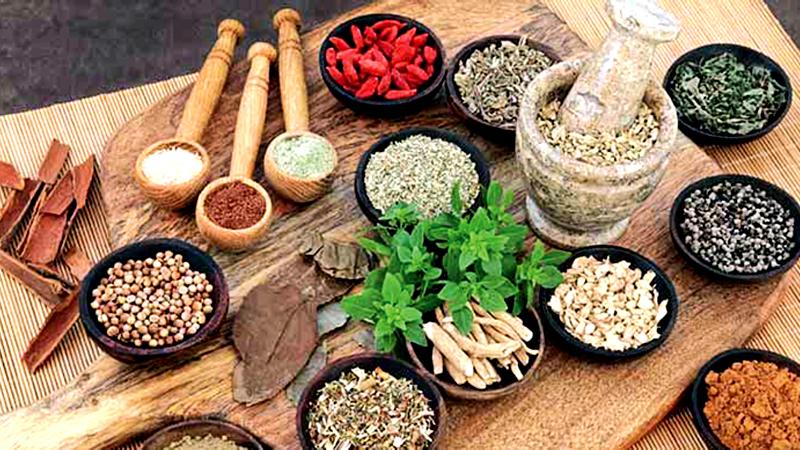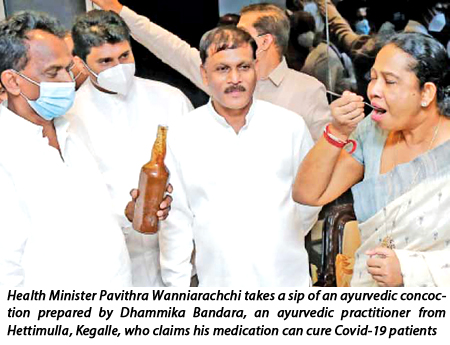
In a pandemic background where the gap between different medical specialisations have widened, at a time when it specifically should be the opposite, a few Sri Lankan Allopathic doctors had the will power, humility and patriotism to come forward on their own volition to subject to testing on Covid-19 patients in hospitals of Sri Lanka, a traditional medical treatment.
 This treatment, made with traditional medical herbs of the country prepared by Dhammika Bandara, a holistic traditional medical practitioner who has elevated his mind to a level to identify and use his cures solely for curing and not for money making has received diverse reactions.
This treatment, made with traditional medical herbs of the country prepared by Dhammika Bandara, a holistic traditional medical practitioner who has elevated his mind to a level to identify and use his cures solely for curing and not for money making has received diverse reactions.
The Allopathic doctors who subjected to formally testing physician Dhammika Bandara’s medicine on Covid-19 patients are Director of Health of the Wathupitiwala Covid Centre, Chula Bandara, Wathupitiwala Covid Centre in charge, Dr. Dhammika Kumara and Colombo National Hospital Assistant Director Dr. Sammiddhi Samarakoon.
Testing the efficacy
The first phase of the test conducted mid-November had 140 Covid-19 patients, who had volunteered to be involved in the study, of which a sample group had been selected through the random selection method. These patients had recorded a recovery within three days after consuming the medicine twice a day in contrast to the same number of patients selected in the same manner, but administered a neutral substance to rule out the placebo effect.
The second phase of testing on a different group of patients had been conducted at the Gampaha National Hospital on the initiative of Medical Specialist, Prof. Aruna Munasinghe (former Secretary General of the World Academic Council of Emergency Medicine) who heads a panel on indigenous knowledge at the National Science Foundation (NSF).
Of 50 patients where 25 patients were administered the traditional medicine and the other 25 patients administered with neutral substance, patients who were given the traditional medicine had recovered within three days. The 25 members who did not receive the medicine did not make recovery in the same time frame as with the initial sample group.
Since the feat of this Kegalle physician went public, there has been many kinds of theories and bouquets and brickbats thrown at him.
Traditional physicians
 Sri Lanka has well over 25,000 traditional physicians throughout the country following the Deshiya Chikitsa (Sinhala Wedakama) and Ayurveda/Siddha. Although there was much enthusiasm by some of these physicians at the early stages, the lack of encouragement through a systematic method to get their medicine, all made of natural herbs, tested on Covid-19 patients had forced them to abandon their zeal, but they had continued with their experiments. Some of them who came on social media were ridiculed.
Sri Lanka has well over 25,000 traditional physicians throughout the country following the Deshiya Chikitsa (Sinhala Wedakama) and Ayurveda/Siddha. Although there was much enthusiasm by some of these physicians at the early stages, the lack of encouragement through a systematic method to get their medicine, all made of natural herbs, tested on Covid-19 patients had forced them to abandon their zeal, but they had continued with their experiments. Some of them who came on social media were ridiculed.
The few bolder ones who spoke openly faced certain backlashes under various purported justifications. The lack of a cohesive understanding between Allopathy, Aurveda and Deshiya Chikitsa was apparent in the fact that, for ten months, there has been no path forward chartered to formally test the medicines the traditional physicians claimed they had or to use a collaborative Covid-19 elimination strategy, such as that used by China.
The overall result of our general apathy and confusion was that no one did what these Lankan Allopathic specialists did last month; testing to see if these medicines worked or not. Now we know that although coming from a little known (apparently unregistered) practitioner, the medicine worked and the focus should be on this as it is the medicine that has cured patients and not his registration.
Medical heritage
What we should grasp at least now is that we should bridge the gap between Allopathy, Ayurveda and Deshiya Chikitsa. The purpose here is to see that there is no rivalry between systems except the common will to uphold the wellbeing and integrity of the country and solve the helplessness against a raging pandemic for which Western science has no solution other than a vaccine that has its share of controversies.
What should be kept in mind by Sri Lankans is that we have in this country a medical heritage which had awed many 19th century Allopathic medical researchers. One such person is Dr. George Clarke, M.D., M.A. of Philadelphia who studied in-depth the Ayurvedic Charaka Samhitha and found that the medical systems of Sri Lanka and India could stem the number of invalids of the world which he openly declared.
The reactions of Western physicians, such as Clarke is explained in the book Herbal Food and Medicines in Sri Lanka by Sri Lankan author, Dr. Seela Fernando. Robert Knox in his book An Historical Relation of the Island Ceylon that traces the 19 years he spent as a captive in the country stated that in the 17th century, each Sri Lankan was a physician in his own right and the forests were their pharmacy.
It is lamentable today that we are almost unrecognisable from the Lankans that Knox described. In the past, every Lankan was knowledgeable on how to use endemic plants either as medicine or food. Due to lack of conservation, we have lost many of these plants, which threatens our traditional medical system.
As a sovereign nation, we are free today as we were at the time of our Kings to use for our nation’s wellbeing the core of our medical heritage for our present and our future. There is nothing that stops us in doing this. The responsibility cannot be thrust on rulers alone.
The Allopathic experts who decided to carry out testing the treatment of a traditional holistic practitioner did this as part of their national responsibility. They did not do it for any personal monetary gain or as a by rote action. They did it as a patriotic initiative for the country.
There are several Allopathic doctors ready to test the treatments prepared by traditional physicians. There are many traditional physicians who have developed some cure. There are also local professionals from many spheres and the clergy, uniting to lobby for using traditional physicians and their cures for the Covid-19 battle in Lanka. They are urging for the testing of these on Covid-19 patients at a time when the increase in the number of patients are posing serious challenges on the Allopathic health system of the country.
Logical alternative
Commonsense tells us that the logical alternative to the insinuations in various platforms, including the media that traditional methods will not work is to subject it to testing on Covid-19 patients. The traditional physicians have inherited this knowledge from many generations or learnt it after years of dedication and/or affiliating themselves to studying nature and/developing their minds as the ancient Rishis, Yogis and Buddhist bhikkhus did, when healing a person of a sickness was not a money making industry but a merit accruing spiritual process.
Despite many obstacles to restoring the stature of Sri Lanka’s traditional medicine, especially its pre Ayurvedic Deshiya Chikitsa (Sinhala Wedakama), a clear long term vision with consistent action, will have many dividends across sectors, such as entrepreneurship, industry and tourism.
With nearly 26,000 traditional physicians in all corners of the country, if testing on Covid-19 patients is facilitated to provide justice to all physicians who say they have the answer to Covid-19, Sri Lanka will be able to decide based on the results whether it need to be as helpless as Western countries that do not have a medical heritage such as ours.
For Western nations to rely entirely on a vaccine that will be the sole Covid-19 saviour is understandable. But for Sri Lanka to blindly follow suit without exploring its own medical goldmine will be a downfall we may never recover from. If ever there was a time to salvage our heritage from post-Colonial oblivion, it is now.
A success story of our traditional medical practitioners will prove to ourselves that the long years of colonisation have not removed from us the intellectual, emotional and ancient scientific understanding of the indigenous medical practice of our land which was the only health system our ancestors depended upon. It will also teach us the difference in how we perceived this concept called science as opposed to how the West perceives it.
It is also important to keep in mind that we should take serious note as a nation to safeguard the intellectual property rights of our traditional physicians to prevent the threat of Sri Lanka losing the patents to any of the curative methods that may come about.
Kindness and compassion
With the Commissioner of Ayurveda Chathura Kumarathunge revealing to the media that the Kegalle physician is not a registered Ayurvedic medical practitioner, a point that arises is the need to help rural indigenous medical practitioners to register formally following due processes. There should be a system in which these practitioners are given due respect in a similar manner that the country did when we had generations who took to healing other human beings not to win social prestige or money but within the framework of Buddhistic principles of kindness and compassion.
The last thing we should allow is for them to be ridiculed or belittled and see to it that this does not happen in any platform. In a background of some scoffing at the Kegalle physician’s holistic or spiritual base that he said he builds his medicines upon, two key points to remember would be:
1. The science lab of Ayurveda which Ayurvedic doctors who now study in universities may agree, first originated in the minds of ancient Yogis, Rishis, Hermits, Saints and Buddhist bhikkhus who spent their lifetimes perfecting their minds and the science of connection with nature enabling wisdom and medical skill.
2. Hippocrates, the ancient father of Modern medicine who emphasised the concept of veriditas (green life force) based on using to the maximum the body’s potential to heal itself through nature/diet, held the process of healing another as a great humane and sacred task and the Hippocrates Oath he drafted for himself was sworn upon Greek gods, chief of them being Apollo the Healer, the Greek patron god for medicine.
